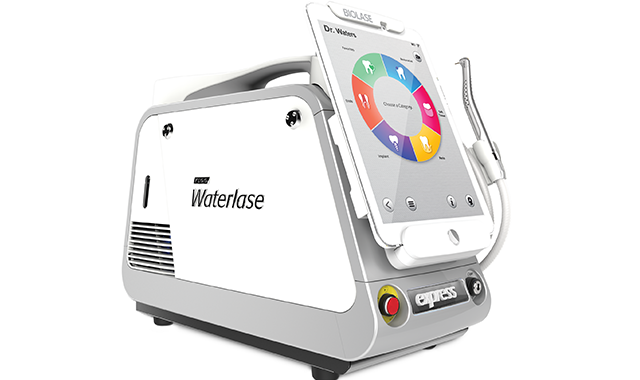Offering comprehensive dental care with laser dentistry
How BIOLASE’s Waterlase Express is transforming treatment planning and patient care.

Dr. Jeff Briney, DDS, has been using lasers in his private practice in Dana Point, California, for the past 10 years. He also does his own surgical, periodontic, orthodontic and endodontic procedures. He sees BIOLASE’s Waterlase Express™ as an indispensable tool for his efforts to cover the spectrum of dental specialties for his patients.
“It is my duty to be as advanced in every one of those specialties in dentistry so that I can provide the best service for my patients,” Dr. Briney says.
Dr. Briney describes his path to the Waterlase Express as baby steps. Originally, he bought an “off-brand” diode laser and incorporated it into the hygiene side of his practice. He switched to BIOLASE’s diode laser eight years ago and moved promptly into the Waterlase line of all-tissue dental lasers over the following year. He now uses both the Waterlase Express and the Waterlase iPlus® in his practice.
Read more: How to choose a dental laser for your practice
Laser dentistry allows him to offer comprehensive dental care to his patients, many of whom he considers friends. He no longer refers his patients to specialists, preferring to treat his patients himself from periodontic and endodontic treatments to preparations for minimally-invasive dentistry. Dr. Briney also uses the lasers for many of his surgical procedures, like crown lengthening or non-surgical osseous periodontal surgery.

Dr. Briney says he did research before his purchase that shows the Waterlase all-tissue dental lasers use the ideal wavelength for the most precise, effective and efficient way to cut hard and soft tissue.
“A lot of other lasers on the market are close to that wavelength but are not idealized for that target tissue,” he explains. “Alternative wavelengths decrease the efficiency and accuracy of the cut. There is also a lot more healing and recovery time when those other wavelengths are used, compared to the wavelength that Waterlase uses.”
Dr. Briney used the Waterlase iPlus for five years before adding the Waterlase Express to his practice. He says he appreciates how easy the Waterlase Express is to use. The simple interface with the touchpad not only helps him handle the laser for treatment but also helps with patient education. He uses the training and education videos in the tablet to show patients what he’s going to do before he does it.
Trending article: 10 ways lasers can make your practice money right now
“It easily transfers into the actual procedure,” he says. “There is no downtime. It’s almost a plug-and-play and touch-and-go interface with the Waterlase Express. It’s a very quick interchange between education of the patient and then right into the procedure.”
Watching the procedures via the tablet animations often solidifies his diagnosis and treatment plan for patients. For example, if patients don’t understand why he recommends a crown lengthening procedure, Dr. Briney shows them how it increases the surface area of the tooth to create a healthier environment for the crown. When patients see the step-by-step 4K HD animation of the treatment available on the tablet, it relieves their anxiety about having the procedure.
Continue to page two to read more...
Dr. Briney thinks patients looking for a new dentist will gravitate toward laser dentists. Patients view lasers as a sign of a technologically advanced office.
“Patients think they are having a higher quality of treatment with a laser versus cutting the bone with a handpiece and drill,” he says. “When they think of the handpiece and drill, they think of Black & Decker from Home Depot. They have a sense of comfort with the laser.”
Dr. Briney performs many laser treatments with only topical anesthesia, including gingivectomies, frenectomies and lingual frenectomies.
Related reading: 5 reasons to revisit lasers for your dental practice
Dr. Briney, who teaches for BIOLASE, would like to see more dental professionals embrace laser dentistry the way medical professionals have.
“Lasers have been in play for quite some time. In the medical field, 90 percent of doctors have them in use, but dentistry is only 10-15 percent at best. The trends are that lasers have a better response for tissue healing and are less invasive. They are the epitome of minimally-invasive-style dentistry,” he says.
Dr. Briney thinks most doctors have concerns about the financials and the learning curve involved with laser dentistry. However, he feels if doctors who are wary of it gave the Waterlase Express a chance, they would change their mind.
“Any doctor who is reluctant is going to do what I did. They want to take baby steps,” he says. “I jumped into laser dentistry with diodes. But as the technology has evolved, the diodes are a hygienist’s laser whereas the Waterlase is a doctor’s laser.”
The Waterlase Express incorporates into many treatments, which translates into a high return on investment for doctors. Also, Dr. Briney says it changes the thought process and treatment planning when you include laser dentistry, which translates into 20-30 percent more revenue on top of what the doctors are doing themselves already.
Trending article: 6 ways to help patients overcome fear of the dentist
“They are adding so many procedures, which is not only better for doctors and the practice but also for the patients’ well-being,” he says.
Dr. Briney also says that when doctors see that a Waterlase Express is $800-$900 per month and they’re going to increase their revenue of that expense five-fold every month, the laser easily pays for itself.
“The Waterlase Express is one of the most affordable all-tissue cutting lasers for a third of the price of other lasers out there, and the Waterlase is doing more procedures compared to those lasers,” he says. “When you see how easy it is to incorporate lasers into the practice and use it for patients, it will be a tipping point of using these lasers as the standard of quality for their practice.”